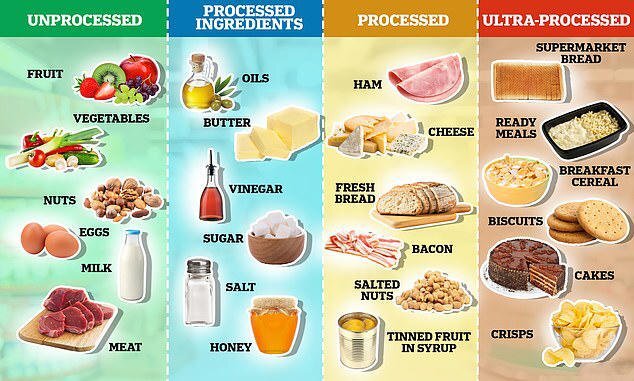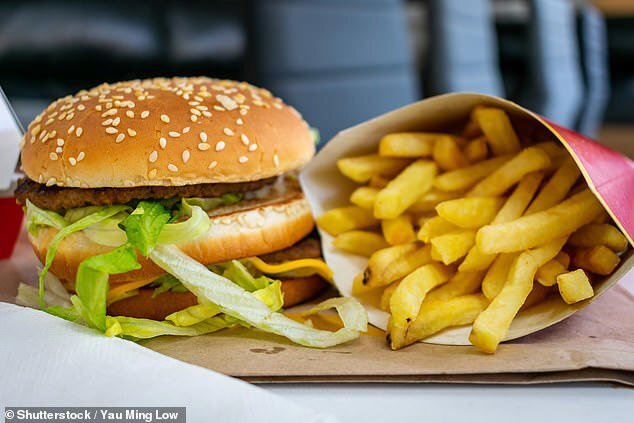Everything posted by Bob
-
How to GAIN WEIGHT on the Carnivore diet?! I do NOT NEED YO LOSE WEIGHT!
If you want to gain muscle, then lift heavy things. If you want to gain fat, you might need to consume more and incorporate more carbohydrates, the safer, less-toxic kinds.
-
Salt necessary?
And ruminant animals, with their multichambered stomachs, do even better and breaking down the plant's self defense toxins that they consume. That's why beef is one of the purest, most nutrient dense foods available. Disgusting, lol. Do have a reference for that in a study somewhere? That would be a valuable reference/resource. I was listening to a video while driving around this morning that said the very same thing about organic foods and spray-overs. Here in the USA, if an animal is given an antibiotic, the law requires several weeks to pass before that animal can be slaughtered, to give it's body enough time to exrete or break it down. The odds of ingesting antibiotics are actually pretty low.
-
Carnivore costs more?
Exactly! lol. I've been told this about several issues - and I've fixed every one of them WITH diet. Sigh!
- What Did You Eat Today?
-
Anyone use Indoor grill?
Oh that looks really interesting. I haven't. The closest thing I have used to one is an old George Foreman grill, which is designed to let the fat roll away from your food to be collected and disposed of. Now that I'm mostly carnivore, I wouldn't dream of letting that wonderful fat go down the drain, lol.
-
What Did You Eat Today?
This morning I had corned beef that comes in a can. It's delicious. Many people have had "Hash" which is canned corned beef mixed with diced potatoes. But you can get it with just the corned beef by itself. I'm the only one that eats it, so I ate it all. It was plenty and didn't need an egg or anything to go with it. Dinner was ground beef while everyone that was over for our little pool party had pizza.
-
Carnivore costs more?
I quite coffee out of desperation in summer 2019. The medical insurance I elected in January of that year REFUSED to pay for my ulcerative colitis meds, which without insurance costs around $2000 USD/mo. So I stopped taking them. By the time March came around I knew I was in trouble because the symptoms started returning. My early May they were debilitating again. My previous doctor said it was not diet related and there was nothing I could do. I started eliminating things from my diet anyway. And over time, as I was reading forums like this one that centered around IBS, IBD, Crohn's, and Colitis, I came across many people who talked about how coffee was a trigger. Well, I would drink and ENTIRE POT on the daily. So I decided to quit, cold turkey, since that was one thing I hadn't eliminated yet. And to my delight, my symptoms went away. I've remained prescription free since 2019.
-
Does anyone watch "alone"
Is that the show on the History Channel that's 8 seasons and counting so far? I never heard of it, but I just Google'd it. @ol_hilly's comment made me think this was a YouTube series.
-
Carnivore costs more?
I'm definitely saving money on this way of eating. Around here, eggs are cheap and ground beef is reasonable. They are satiating and so I am not snacking all day long on process junk that just keep fueling my hunger. I use a lot less TP also from a roll a day when I had ulcerative colitis to just a few squares a few times a week. Quitting coffee has saved me tons. Mind you, before this, I was all about the convenience. Hitting up Starbucks in the morning, fast food for lunch, and dining out at dinner were regular features of mine several days a week. Now I only occasionally do any of that. Truthfully, just learning to cook at home, regardless of what diet you are doing, will save you some cash.
-
Do you name the critters that your going to eat?
What's that? When I think of a Taurus I think of a car manufactured by Ford. When I Google it, I just get pages of results about astrological stuff.
-
grinding some beef
Dude, my dog is so spoiled, lol. She get's her own little portion of scraps or leftovers several times a week.
-
What Did You Eat Today?
I worked at Papa John's Pizza, Marco's Pizza, and East of Chicago Pizza as well as a local place called Guido's Pizza back in the 90's and none of them ever used oils on their pizza. Now, with that said, shredded cheese has some fillers/anti-caking agents in it, but it's pretty benign. My son picks the cheese off his pizza and I in turn gobble it up, lol. I'll occasionally get a "pizza bowl" if the wife is buying pizza for everyone else that night (complete with the tomato sauce). I personally do not fund pizza purchase, lol 😄 I've become very fond of lamb. I'll get ground lamb, lamb chops, and the lamb ribs. Sam's sells a 5lb leg of lamb that I haven't got yet, but should. I just think I need a bigger knife first, lol.
-
Salt necessary?
This is true. That's why they call it the "Standard American Diet". It's SAD (get it, lol ). Glyphosate. They spray it on everything. It is best to try and avoid consuming anything treated with glyphosate as much as humanly possible, for sure. 👍 Glad to hear she has found a way to find some relief. As you may recall, I had terrible ulcerative colitis. I cured mine by quitting coffee. This fixed it to where I didn't need meds anymore. I feel like my carnivore diet put the final nail in the coffin of my UC but I can't really prove it. Quitting coffee gets most of the credit in my case. What was in the coffee? Who knows? Oxylates maybe. Too much caffeine. Glyphosate. Mold. A combination of all of the above? I'm just glad it's gone and I still have my colon. I doubt Roundup will get banned in the USA. Money controls everything over here.
-
Salt necessary?
So the way to test that, IF you want, is to do Lion Diet for at least 30 days or until your symptoms disappear. Then reintroduce JUST the shake (Lion Diet + shakes) and see if the symptoms return. If they do, we can pretty much assume it's something in the shake.
- What Did You Eat Today?
- What Did You Eat Today?
- What Did You Eat Today?
-
Can you recommend a good carnivore book?
This is difficult to answer. I would say most people do best when they keep the carbs very low, whether that's a meat-based keto (20g a day or less), ketovore (10g a day or less), or carnivore (trace carbs, if any). This would rule out the "Animal-based" diet, because the fruit and honey have sugar and carbs in them. Can you still lose weight if you go animal-based? It's possible, but it will likely be much slower than a ketogenic diet.
- Jesus was NOT a vegan - Behind the Christspiracy! [Video/Podcast]
-
Salt necessary?
If you re-introduced a food and "it went right through you", this could be simply because the cells in your digestive tract that were previously tolerant to that food are now gone and replaced by new cells that haven't been exposed to that food. But since you mentioned increased inflammation and inner ear symptoms, that's probably a good sign that this vegan drink isn't all that good for you after all.
-
Seeing is Believing! My Amazing Carnivore Diet Results! [Video/Podcast]
Thanks. Treadmill is still in the garage since I bought it, lol. I did set up my pool though. You can actually get a good workout in there too.
-
Best Type of Salt
There would be some logic to this. Iodized salt has iodine added to it. This is beneficial. But at the same time, it's refined, and all the trace minerals have been removed. You still get these trace minerals in sea salt, real salt, pink salt, etc. So if you mix them together, you get some trace minerals, and the iodine. Morton's table salt has dextrose in it as an anti-caking agent, but it's still 99% sodium chloride so that dextrose is pretty trivial.
-
Vegan fake meats are linked to increase in heart deaths
Vegan fake meats are linked to increase in heart deaths Experts say plant-based diets can boost health – but NOT if they are ultra-processed Story by Rebecca Whittaker For Mailonline and Kate Pickles Health Editor For The Daily Mail UPFs such as vegan burgers and cakes increase risk of heart death, study says READ MORE: All the potentially deadly health dangers of energy drinks Replacing meat and dairy with plant-based swaps might not be the simple health hack you think it is. Although eating fresh vegetables is linked with a lower risk of cardiovascular diseases, you may want to reconsider how many vegan burgers and cakes you tuck into. Scientists found opting for ultra-processed plant-based products — such as vegan sausages burgers intended to replace animal-based foods, as well as cakes and crisps — is linked with 15 per cent higher risk of suffering heart attacks and strokes. That's according to analysis of more than 118,000 participants' diets from the UK Biobank study. Packed with fat, salt and laden with sugar ultra-processed foods have long been vilified for increasing heart attack and stroke risk. Although eating plant-based foods is associated with a lower risk of cardiovascular diseases, you may want to reconsider how many vegan burgers you are tucking into as researchers say UPF foods could increase risk © Provided by Daily Mail Now research published in Lancet Regional Health - Europe, suggests these dangers are even present in plant-based UPF's, with a high consumption linked to a 15 per cent increase in heart death. The research, which involved experts from Imperial College London, utilised data from more than 118,000 Brits, aged 40 to 69 years, who had their diets assessed over at least two days. Scientists split food into plant-based products, such as fruit, vegetables, grains, bread, as well as cakes and sweets, and animal-based products such as fish, poultry, red meat, eggs and dairy. The two groups were then further divided into either ultra processed (UPF) and non-ultra processed. This data was then linked to hospital and mortality records to obtain information on cardiovascular diseases. An easy sign a food could be a UPF is if it contains ingredients you wouldn't find in your kitchen cupboard, such as unrecognisable colourings, sweeteners and preservatives. Another clue is the amount of fat, salt and sugar lurking inside each pack, with UPFs typically containing high amounts© Provided by Daily Mail People who ate a lot of plant-based ultra-processed foods had a 7 per cent greater risk of suffering conditions like blocked heart vessels and had a 15 per cent heightened risk of dying when compared to vegetarians whose diets had less. Upping intake of none-processed vegetarian foods – such as fresh fruit and vegetables – by 10 per cent was linked to an 8 per cent lower risk of getting heart disease. Deaths from heart disease fell by a fifth in vegetarians who consumed the least UPFs and 13 per cent in cardiovascular disease overall – caused by a build-up of fatty deposits inside the arteries. Dr Eszter Vamos, co-author of the study, from Imperial College London’s School of Public Health, said: ‘Fresh plant-based foods such as fruits and vegetables, wholegrains and legumes are known to have important health and environmental benefits. ‘While ultra-processed foods are often marketed as healthy foods, this large study suggests that plant-based ultra-processed foods do not seem to have protective health effects and are linked to poor health outcomes.’ Food additives and industrial contaminants present in these foods could cause oxidative stress and inflammation, the scientists suggest. They added that nutritional guidelines promoting plant-based diets and cutting down on meat must also promote the importance of avoiding UPFs for good heart health. Packed with fat, salt and laden with sugar ultra-processed foods have long been vilified for increasing heart attack and stroke risk© Provided by Daily Mail Study author Dr Fernanda Rauber, an expert in preventative medicine from the University of São Paulo in Brazil, said the it's the first to show plant-based ultra-processed foods are associated with increased the risk of cardiovascular diseases. 'Despite being plant-based, these foods may contribute to risk factors such as dyslipidemia and hypertension due to their composition and processing methods,' she said. 'Food additives and industrial contaminants present in these foods might cause oxidative stress and inflammation, further aggravating the risks. 'Therefore, our results support the shift towards plant-based food choices that consider the degree of processing to improve cardiovascular health outcomes.' But independent experts said it was critical the study's findings are out into context. They highlighted how research study lumped all plant-based UPFs together a process that included crisps, cakes, sweets and other fatty foods known to be bad for our heart health. Professor Gunter Kuhnle, an expert in nutrition and food science at the University of Reading said: 'The results of the latest study on ultra-processed food are not surprising, as “plant-based ultra-processed foods” include foods that are well known to have an adverse effect on health: foods that are high in sugar, fat and salt.' 'The foods included are for example “pastries, buns and cakes”, “confectionary” and “soft drinks” – and their impact on health has been well known before the concept of ultra-processing has been popular,' he added. 'This might cause confusion among casual readers, as it could be misunderstood as plant-based alternatives to animal products such as plant-based drinks or meat alternatives. However, these foods appear to contribute only a small amount of total “UPF” intake in this study,' Professor Kuhnle stresses. He adds that it's also 'not surprising' that eating more minimally processed food, such as fruit and vegetables, was a positive for heart health. The study catagorises all plant-based UPFs together which includes crisps, cakes, sweets and other fatty foods which are known to be bad for our heart health© Provided by Daily Mail Dr Duane Mellor, dietitian and spokesperson for British Dietetic Association also said the way the study was designed needed to be considered. 'It explored the effects of all plant based ultra-processed foods – although this included plant-based meat alternatives, these only made up 0.2 per cent of the energy from ultra-processed foods consumed by participants who were followed during the study,' he said. 'The main foods which were considered as plant-based ultra-processed foods were processed baked foods including packaged breads, pastries and cake and biscuits along with crisps and soft drinks,' he said. Dr Mellor added: 'So this study possibly highlights the problem that many foods that do not contain animal products, which includes biscuits, crisps, confectionary and soft drinks, are technically plant based but would not be considered essential as part of a healthy diet by the majority of people. 'So, it is important to emphasise that just because a food or drink is technically plant based, it does not mean it is healthy.' Dr Hilda Mulrooney, a nutrition & health expert from London Metropolitan University, said the findings will ‘cause a stir’. She said: ‘It is an area well worth exploring; I don’t agree with the premise that just because something is "plant-based", it is automatically healthy. ‘However, I also don’t think when people think of "plant-based" they think of bread, cereals etc. I imagine they think more of meat, fish and dairy product alternatives.’ She added: ‘Although some may assume the message of this study is that all ultra-processed plant-based foods are bad for health, I think that in fact what the evidence in the study actually shows is that poor diets are associated with increased risk of chronic diseases.’ Dr Mulrooney also believes there are limitations to the study. She said: 'The study remains limited to showing associations and causality cannot be demonstrated. It also relies entirely on the NOVA classification system and a number of concerns about this have been raised – particularly that it assumes that the health implications of a foodstuff are based only on the degree of processing, rather than their nutritional content. 'For example, breakfast cereals are classed as ultra-processed and therefore should be avoided according to the rationale of the authors, but we know from the NDNS in the UK that breakfast cereals are important contributors to intakes of several nutrients.' UPFs are foods that have undergone various modifications to extend their shelf life or make them more appealing to the consumer, or sometimes both. An easy sign a food could be a UPF is if it contains ingredients you wouldn't find in your kitchen cupboard, such as unrecognisable colourings, sweeteners and preservatives. Another clue is the amount of fat, salt and sugar lurking inside each pack, with UPFs typically containing high amounts. ARTICLE SOURCE: https://www.msn.com/en-us/health/other/vegan-fake-meats-are-linked-to-increase-in-heart-deaths/ar-BB1nYBKR?
-
Feature your content on Carnivore Talk
This is an example of a blog post. The "Blog" feature is part of the software suite that Carnivore Talk uses for it's community, which we make available to active members. You can start a Blog and write your own articles here, as well as embed video, images, links, and more. You can create subcategories, customize the sidebar, feature a photo, either through a direct upload to the Blog post or by choosing one from the Image Gallery. Recent blog entries will be featured in sidebar blocks across the community, potentially driving visitors to your content.
-
Can you recommend a good carnivore book?
Yes, Paul Saladino's "Carnivore Code" is a great book but very deep, detailed, science-y, with a ton of research and references. I'm currently working through this one. I have Shawn Baker's "The Carnivore Diet" which I have flipped through but haven't read yet - as I only do one at a time. I also read Dr. Ken Berry's "Lies My Doctor Told Me" and "Kick Ass After 50", which aren't carnivore books per se, but he's a carnivore advocate and they made for good reads. His books are written in easy to understand language.





